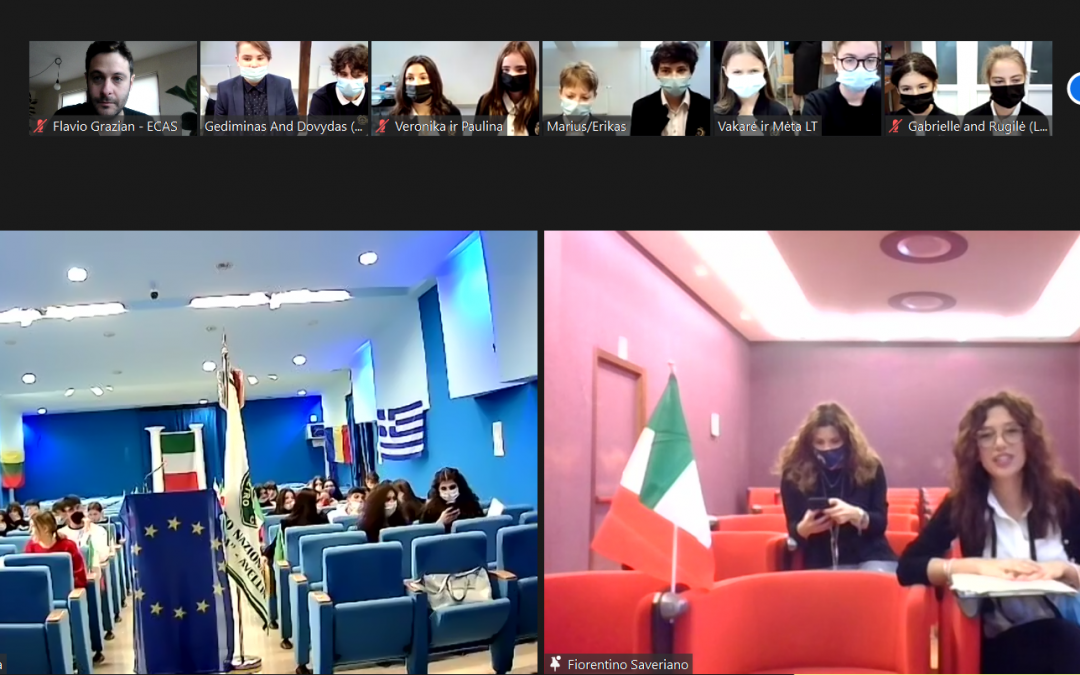The Road to the European Parliament 2019 – Empowering a New Generation of EU Citizens (REP2019)
In 2017, the European Union (EU) signed the Istanbul Convention The Council of Europe Convention on Preventing and Combating Violence Against Women and Domestic Violence, also referred to as the the Istanbul Convention, which acts as a benchmark for international standards on gender-based violence. Currently, there is no specific legal instrument to address gender-based violence at the EU-level. However, the topic is covered in several directives and regulations.
The Commission has announced intentions (Commission Work Programme 2021) to create a new legislative proposal to prevent and combat gender-based violence against women and gender violence. This proposal aims to strengthen the actions taken by the Member States through ensuring a minimum level of protection both online and offline across the EU.
On 12 November 2021, high school students from Lithuania, Spain and Italy, once again took on the role of the EU institutions, and this time they decided to work on a Directive addressing gender-based violence. This event was supposed to take place in Mercogliano, Italy, however due to the ongoing pandemic this event was done virtually.. Greece and Romania were unable to attend.
The event began with a wonderful video introduction of the host country: Mercogliano, Italy. The aim of this simulation game was for the high school students to discuss, debate and agree on the Directive on gender-based violence proposed by the European Commission (Italy). The simulation began with a brief introduction to the topic of gender-based violence and a short video by the United Nations Secretary-General’s Campaign UNiTE to End Violence Against Women. Following this introduction to the topic, Italy (European Commission) presented their Directive with proposals to be discussed and debated by the European Parliament (Lithuania, Spain, Italy).

The European Parliament (Lithuania, Spain, Italy) presented their position on the different proposals to the rest of their colleagues. Some of the raised points included:
Proposal 1: Establish minimum and specific rules for sanctioning gender based violence
- Collaboration among Member States to establish common policies
- It is essential that all policies and rules are the same across all Member States
- Establish a functional sanctioning system that supports victims of gender-based violence
Proposal 2: Establish preventative measures to protect victims
- Implementation of educational and training programmes in schools to start conversations about gender and point out the different stereotypes children and younger generations encounter regarding gender
- Foster a culture of acceptance
- Implement training and educational programmes across all Member States in all social areas
Proposal 3: Establish protective measures to protect victims
- Establish local and regional, as well as pan-European anti-violence help centers and networks with trained professionals who can provide psychological, social and financial support to victims of gender violence
- Establish an online help centre for victims of gender violence
- Establish regional and local task forces with employees who are specifically trained in dealing with gender-based violence cases
Proposal 4: Establish provisions in support of victims and compensation measures
- Establish a formal definition of the process of criminal cases for gender-based violence
- All Member States should provide protection for the children/witnesses of gender-based violence – prevent the abuser from getting custody rights of minors/children
- Free of charge state accommodation for victims of gender-based violence – ensure anonymity of victims who are in these accommodations
- Prohibit the perpetrator from approaching the victim
Proposal 5: Establish measures to prevent and tackle online violence and harassment
- It is essential to adopt stricter restrictions for online platforms and social networks to prevent and address online violence
- Establish greater restrictions on the access of violent video games to certain age groups – this could include different settings for video games for different age groups
- Pandemic has increased the amount of gender-based violence on online platforms and social networks
- Collaborate with public and private entities to control the monitoring of detecting abusive content on social media
- Use artificial intelligence and technology to remove the personal data of victims of online violence and harassment
- Generate awareness of online violence and harassment – training and educational programmes
Proposal 6: Ensure freedom and integration of LGBTQ+
- There should be a separate directive that focuses solely on LGBTQ+ and ensures the rights of LGBTQ+ individuals
- Create common policies which support integration and equal rights for LGBTQ+ individuals
- Training programmes to foster acceptance of all individuals regardless of their sexual orientation
The overarching theme from all interventions from the European Parliament (Lithuania, Spain and Italy) was the importance of establishing and implementing measures and regulations that are the same across all Member States. There must be collaboration between all Member States in order to create a functional and protective Directive in regard to gender-based violence. The European Parliament also emphasised the necessity to monitor, regulate and prevent online violence and harassment.
After taking into consideration the feedback and final remarks by the European Parliament, the final vote was:
Proposal 1 to 6: Approved by Qualified Majority
The final voting signaled for the end of the workday and the event.
The next simulation event will take place in Romania (virtually) on 25 November.


Recent Comments